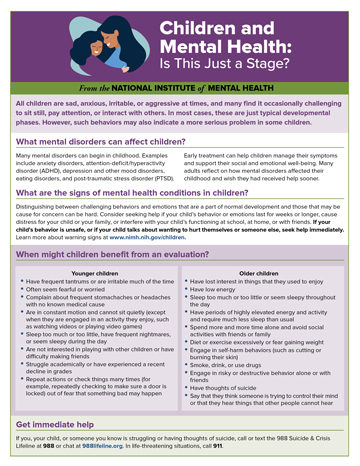 As a marriage dissolves, some parents find themselves asking questions like, “Should we stay together for the kids?” Other parents find divorce is their only option.
As a marriage dissolves, some parents find themselves asking questions like, “Should we stay together for the kids?” Other parents find divorce is their only option.
The good news is, parents can take steps to reduce the psychological effects of divorce on children. A few supportive parenting strategies can go a long way to helping kids adjust to the changes brought about by divorce.
Why the First Year Is the Toughest
Kids are likely to experience distress, anger, anxiety, and disbelief. But many kids seem to bounce back. They get used to changes in their daily routines and they grow comfortable with their living arrangements. Others, however, never really seem to go back to “normal.” This small percentage of children may experience ongoing—possibly even lifelong—problems after their parents’ divorce.
Emotional Impact of Divorce
Divorce creates emotional turmoil for the entire family, but for kids, the situation can be quite scary, confusing, and frustrating.
Young children often struggle to understand why they must go between two homes. They may worry that if their parents can stop loving one another that someday, their parents may stop loving them.
Grade school children may worry that the divorce is their fault. They may fear they misbehaved or they may assume they did something wrong.
Teenagers may become quite angry about a divorce and the changes it creates. They may blame one parent for the dissolution of the marriage or they may resent one or both parents for the upheaval in the family.
Helping Kids Adjust
Co-Parent Peacefully
Intense conflict between parents has been shown to increase children’s distress. If you struggle to co-parent with your ex-spouse, seek professional help.
Avoid Putting Kids in the Middle
Asking kids to choose which parent they like best or giving them messages to give to other parents isn’t appropriate. Kids who find themselves caught in the middle are more likely to experience depression and anxiety.
Maintain Healthy Relationships
A healthy parent-child relationship has been shown to help kids develop higher self-esteem and better academic performance following divorce.
Use Consistent Discipline
Establish age-appropriate rules and follow through with consequences when necessary.
Monitor Adolescents Closely
When parents pay close attention to what teens are doing and who they spend their time with, adolescents are less likely to exhibit behavior problems following a divorce.
Empower Your Children
Teach your child that although dealing with divorce is difficult, he has the mental strength to handle it.
Teach Coping Skills
Kids with active coping strategies, like problem-solving skills and cognitive restructuring skills, adapt better to divorce. Teach your child how to manage his thoughts, feelings, and behaviors in a healthy way.
Help Kids Feel Safe
Fear of abandonment and concerns about the future can cause a lot of anxiety. But helping your child feel loved, safe, and secure can not only reduce clinginess but also diminish the risk of mental health problems.
Seek Parent Education
There are many programs available to help reduce the impact divorce has on kids. Parents are taught co-parenting skills and strategies for helping kids cope with the adjustments.
Get Professional Help
Reducing your stress level can be instrumental in helping your child. Practice self-care and consider talk therapy or other resources to help you adjust to the changes in your family.
Excerpted from “The Psychological Effects of Divorce on Children” in Verywell Family. Read the full article online for more details and strategies.







